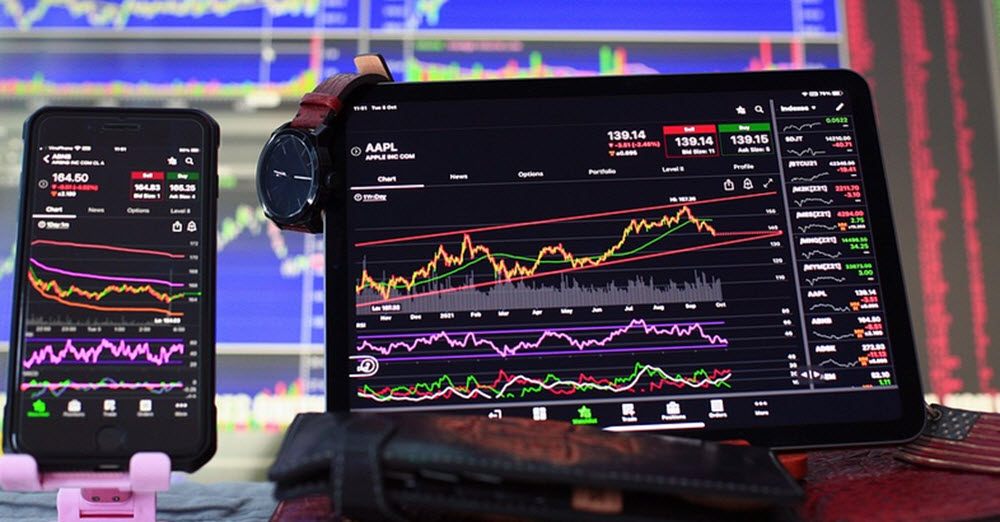In this article we will focus on the type of trading platforms used for trading securities and similar financial products online. This type of trading platforms are software applications that allow traders to place trades and monitor accounts through financial intermediaries, i.e. brokers. These platforms facilitate the buying and selling of securities such as stocks, bonds, commodities, and currencies.
In the 21st century, securities trading and speculation have become much more accessible thanks to the development of online trading platforms and the emergence of online brokers specializing in retail clients. You no longer need a big bankroll to get started with trading as a hobby, and you do not need to obtain access to platforms intented only for professional traders.
For the prospective hobby trader, it is also good to know that a lot of so-called ”trading” taking place on retail trading platforms online is actually about gaining exposure to price movements rather than actually buying and selling assets. There are many ways for traders to gain exposure to price movements – e.g. the price movements of an exchange-traded share – without actually purchasing the asset, becoming the registered owner and then trying to match with a suitable buyer. The fact that you can gain exposure without actually buying and selling can reduce transaction costs quite a bit and it also makes it easier for traders all over the world to speculate on instruments and financial products from various countries.
In this article, we will take a look at trading platforms developed for and used by ordinary retail traders – including very small scale traders who have trading as a hobby. Trading platforms are essential tools for modern traders, offering access to global markets and a range of features to enhance trading efficiency and effectiveness. By choosing the right platform and understanding its features, traders can better navigate the complexities of financial markets.
A few examples of retail trading platforms
- E*TRADE: Known for its user-friendly interface and educational resources. This platform can be used to gain exposure to a wide range of instrument types.
- TD Ameritrade: A comprehensive trading platform known for having advanced trading tools and extensive research resources.
- Robinhood: Robinhood has become especially popular among small-scale traders as certain trading here is commission-free.
- MetaTrader 4 (MT4): Widely used for its robust features and automated trading capabilities. This trading platform was created for forex trading, but will also permitt certain other types of trading.
- MetaTrader 5 (MT5): Comes from the same developer as the MT4, but offers even more tools for technical analysis, e.g. more timeframes. It is also more of an allround trading platform; it does not have the same emphasis on forex trading.
- cTrader: An allround trading platform known for its intuitive interface and advanced trading tools. Just like MT4 and MT5, it has a lot of support for charting and technical analysis, including a very large and varied toolbox.
- Coinbase: Coinbase is a platform where you can gain exposure to cryptocurrency. It is known to be a user-friendly platform and has a wide range of supported cryptocurrencies.
- Binance: This cryptocurrency platform is known for its low fees and extensive range of trading pairs.
- Kraken: This cryptocurrency platform offers advanced features and strong security measures.
Independent third-party trading platforms vs. proprietary broker platforms
Independent third-party trading
Independent third-party trading platforms are platforms that many different brokers can send their clients to. Examples of well-known independent platforms are MT4, MT5 and cTrader which are all utilized by a very large assortment of brokers.
Learning how one of the big independent trading platforms work means that it will be easier for you to switch to another broker, since you do not have to switch platform and learn how a completely different platform works. If you for instance learn how to use cTrader, there will be a huge selection of cTrader-compatible brokers to chose from if you ever decide that your current broker isn´t optimal for you anymore. This flexibility can reduce the risk of staying with a broker too long simply because it is to much of a hassle to switch platform.
A downside with many of the large independent platforms is that they can feel overwhelming for a novice trader. Many of them are constructed to have ”every feature, for every trader” and getting used to them can take a while. They can also feel unncessesarily heavy and stuffed for someone who does not need all the bells and whistles for their trading, including traders who do not utilize technical analysis.
Proprietary broker platforms
Many brokers offer a proprietary platform that was specially developed for this particular broker and is accessable only for their clients. Sometimes this is the only available platform; sometimes it is offered alongside one or more independent platforms.
Proprietary platforms can be nisched and come with special features, e.g. a very strong focus on social trading.
Some proprietary platforms are especially suitable for novice traders, since they are minimalistic and very easy to understand.
Key Features
Order Execution
Trading platforms provide various order types, such as market orders, limit orders, and stop orders, to help traders execute trades according to their strategies.
Toolf for Charting and Technical Analysis
Advanced charting tools and technical indicators help traders analyze market trends and make informed decisions.
Real-Time Data
Access to real-time market data, news, and analysis is crucial for timely decision-making.
Customization
Many platforms offer customizable interfaces and tools to cater to individual trading preferences.
Benefits
- Accessibility: Trading platforms provide access to global financial markets from anywhere with an internet connection.
- Efficiency: Automated features and fast order execution enhance trading efficiency.
- Research and Analysis: Integrated tools and resources aid in market analysis and strategy development.
Risks and Considerations
- Security: Ensure the platform uses robust security measures to protect personal and financial information.
- Reliability: Choose a platform with a strong track record of reliability and uptime to avoid technical issues during trading.

